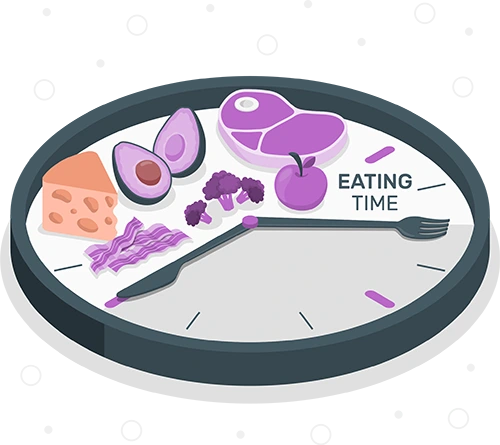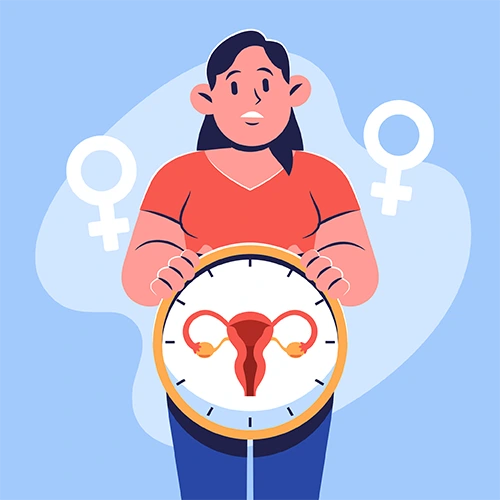Polycystic Ovary Syndrome (PCOS) is a common hormonal disorder affecting millions of women worldwide and is a major contributor to infertility, weight gain, and metabolic issues. One of the most frustrating symptoms of PCOS is unexplained weight gain, often driven by insulin resistance and hormonal imbalances. Many women struggle to lose weight despite following diet and exercise routines, which can lead to emotional stress, anxiety, and low self-esteem.
In recent years, intermittent fasting for PCOS weight loss has gained attention as a potential strategy to improve insulin sensitivity and support fat loss. But does it actually work, or is it just another health trend? Before experimenting with fasting, it’s important to understand timing and structure — tools like an intermittent fasting calculator can help estimate safe fasting and eating windows based on individual needs. Let’s explore the science and determine whether intermittent fasting is a myth or a reality for women with PCOS.

What Is Intermittent Fasting?
Intermittent fasting is an eating pattern that alternates between periods of eating and fasting. Unlike traditional diets, intermittent fasting focuses on when you eat rather than what you eat. The most common methods include:
16:8 method: Fasting for 16 hours and eating within an 8-hour window.
5:2 method: Eating generally for five days and significantly reducing calories for two non-consecutive days.
Alternate-day fasting: Alternating between normal eating and fasting every other day.
You can select a perfect diet plan according to your body type by using an intermittent fasting calculator.

PCOS and Weight Gain: What’s the Link?
Women with PCOS often experience weight gain due to insulin resistance, a condition where the body’s cells don’t respond appropriately to insulin, also called “Insulin Resistance.” Insulin is responsible for the conversion of sugar from foods into energy. The elevated insulin levels in the bloodstream can trigger fat storage, particularly around the abdomen, leading to belly fat, which is hard to eliminate. Accumulation of abdominal fat can become a cause of the development of cardiac illnesses. Additionally, hormonal imbalances (elevated androgens and estrogen) can further contribute to difficulty losing weight. Furthermore, these women are at a higher risk of uterine cancer, breast cancer, diabetes, sleep apnea, and heart disease. For women with PCOS, traditional weight loss strategies may not always be practical, leading them to explore alternatives like intermittent fasting for PCOS weight loss.

How does Intermittent Fasting affect insulin Sensitivity in PCOS?
One of the critical reasons intermittent fasting might work for PCOS weight loss is its impact on insulin sensitivity. Studies suggest intermittent fasting can lower insulin levels, improve insulin sensitivity, and promote fat loss, especially for those dealing with insulin resistance, a hallmark of PCOS. By reducing insulin spikes, intermittent fasting for PCOS weight loss can help women manage their weight and symptoms more effectively.
Challenges of Intermittent Fasting for Women with PCOS
Women with PCOS often face challenges during intermittent fasting.
During IF, on the one hand, improvement in insulin sensitivity occurs, but on the other hand, the rise of cortisol (stress hormone) can worsen PCOS symptoms in many women. PCOS comes with a massive set of hormonal fluctuations, causing fatigue and lower energy levels; IF can worsen it, especially during the adjustment phase.
Why is losing weight with PCOS so hard?
PCOS can make weight loss a difficult task, especially for females of childbearing age, because of several factors linked to hormonal imbalances and metabolic issues. Insulin resistance is a significant factor, causing the body to store more fat and making it harder to burn calories efficiently. Elevated androgen levels (male hormones) in women with PCOS contribute to weight gain and abdominal fat, which is more resistant to loss. Additionally, PCOS often leads to a slower metabolism, meaning fewer calories are burned at rest. Chronic inflammation and irregular menstrual cycles further disrupt the body’s ability to regulate weight. These factors combine to make weight loss challenging despite diet and exercise efforts.

What is the best intermittent fasting schedule for PCOS?
The best intermittent fasting (IF) schedule for PCOS weight loss typically includes the 16:8 method, where you fast for 16 hours and eat during an 8-hour window. For example, you might eat between 12 PM and 8 PM, allowing you to skip breakfast but enjoy lunch and dinner. Some women may succeed with a 14:10 schedule, fasting for 14 hours and eating over 10 hours, which can be more manageable. The key is to choose a schedule that fits your lifestyle and helps you maintain balanced meals, focusing on whole foods to improve insulin sensitivity and overall well-being.
Intermittent Fasting for PCOS weight loss: Myth or Reality?
Intermittent fasting for PCOS weight loss is a topic still being researched for various evidences. However, much evidence supports its effectiveness in weight loss.
- Intermittent fasting reduces calorie intake; since women with PCOS face more fat accumulation, IF can benefit them, as it can result in fat loss.
- Women with PCOS often deal with specific health issues such as heart disease, diabetes, elevated inflammation markers, and cancer. Intermittent fasting helps improve an individual’s overall metabolic health, which benefits women with PCOS.
- Many women with PCOS have shared success stories of losing weight with intermittent fasting. Although individual results vary, intermittent fasting for PCOS weight loss has worked for some in achieving long-term results.
- However, it’s important to note that while some women with PCOS may benefit from intermittent fasting, it’s not a guaranteed solution for everyone. Factors like age, activity levels, and the severity of PCOS symptoms can all influence how effective IF will be.

Key Takeaways
So, is intermittent fasting for PCOS weight loss a myth or reality? The answer depends on the individual. While intermittent fasting can help improve insulin sensitivity and support weight loss, it doesn’t work the same for everyone. For some women with PCOS, intermittent fasting can be an effective tool for weight loss and symptom management, but it’s crucial to approach it with caution and personalization.
Frequently Asked Questions:
How many hours of intermittent fasting for PCOS?
For women with PCOS, a common intermittent fasting (IF) method is the 16:8 approach, where you fast for 16 hours and eat within an 8-hour window. This schedule helps improve insulin sensitivity, a key concern for managing PCOS symptoms.
How to lose weight with PCOS fast?
To lose weight quickly with PCOS, focus on a low-carb, high-protein diet to improve insulin sensitivity, paired with regular strength and high-intensity interval training (HIIT) for optimal fat burning. For additional support, consider consulting a healthcare provider about medications like metformin and supplements such as inositol to enhance results.
How much weight can I lose in 1 month with PCOS?
With PCOS, weight loss in a month can vary depending on metabolism, diet, and exercise. On average, a healthy and sustainable weight loss rate is 1 to 2 pounds per week, totaling 4 to 8 pounds in one month.
What is the best morning drink for PCOS weight loss?
The best morning drink for PCOS weight loss includes green tea, which boosts metabolism, or lemon water that aids digestion and detoxification. Alternatively, an apple cider vinegar drink can improve insulin sensitivity, while a spinach protein smoothie provides fiber and protein to keep you full and energized.
Which exercise is best for PCOS weight loss?
The best exercises for PCOS weight loss typically include strength training, cardiovascular workouts, and high-intensity interval training (HIIT). Strength training helps build muscle and boost metabolism, while cardio (like brisk walking, running, or cycling) improves overall cardiovascular health and burns calories.
What are the results of Intermittent fasting for PCOS?
Intermittent fasting can produce positive results for women with PCOS, including weight loss, improved insulin sensitivity, and more regular menstrual cycles. Additionally, IF may reduce inflammation, enhance energy levels, and help regulate appetite, making it a beneficial approach for managing PCOS symptoms.
What is the impact of intermittent fasting in PCOS on fertility?
Intermittent fasting may have a positive impact on fertility for women with PCOS by improving insulin sensitivity and hormonal balance. By helping to regulate menstrual cycles and reduce body weight, IF can enhance ovulation and potentially increase the chances of conception. However, it’s essential to approach fasting mindfully and consult a healthcare provider to ensure that it aligns with individual health needs and fertility goals.
This article is for informational purposes only and does not substitute professional medical advice. Consult a qualified healthcare provider for personalized guidance.


